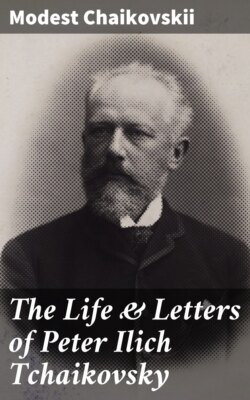Читать книгу The Life & Letters of Peter Ilich Tchaikovsky - Chaikovskii Modest - Страница 28
На сайте Литреса книга снята с продажи.
V
ОглавлениеTable of Contents
1868-1869
Externally, Tchaikovsky’s life had remained unchanged during this period. His lessons at the Conservatoire slightly increased, and his salary consequently rose to over 1,400 roubles (£140). Under these circumstances he began to think of finding separate quarters, since his life with Nicholas Rubinstein was unfavourable to his creative work. The latter, however, would not consent to this, and Tchaikovsky himself had doubts as to whether his income would suffice for a separate establishment.
To Modeste Tchaikovsky.
“September 3rd (15th).
“I have been working like a slave to-day. The day before yesterday I received an unexpected summons to attend at the theatre. To my great surprise I found two choral rehearsals of my opera (The Voyevode) had already been given, and the first solo rehearsal was about to take place. I have undertaken the pianoforte accompaniment myself. I doubt the possibility of getting up such a difficult work in a month, and already I shiver with apprehension at all the hurry-skurry and confusion which lie before me. The rehearsals will take place almost daily. The singers are all pleased with the opera....”
To Anatol Tchaikovsky.
“September 25th (October 7th).
“ ... When I saw that it was impossible to study my opera in so short a time, I informed the directors that so long as the Italian company remained in Moscow and absorbed the time of both chorus and orchestra, I would not send in the score of my work. I wrote to Gedeonov to this effect. In consequence, the performance is postponed until the Italians leave Moscow. I have a little more leisure now. Besides, Menshikova already knows the greater part of her rôle by heart. I lunched with her to-day, and she sang me several numbers from the opera, by no means badly. Time, on the whole, goes quickly and pleasantly.
“I have some good news to give you about my future work. A few days ago I was lunching with Ostrovsky, and he proposed, entirely of his own accord, to write a libretto for me. The subject has been in his mind for the last twenty years, but he has never spoken of it to anyone before; now his choice has fallen upon me.
“The scene is laid in Babylon and Greece, in the time of Alexander of Macedon, who is introduced as one of the characters. We have representatives of two great races of antiquity: the Hebrews and the Greeks. The hero is a young Hebrew, in love with one of his own race, who, actuated by ambitious motives, betrays him for the sake of Alexander. In the end the young Hebrew becomes a prophet. You have no idea what a fine plot it is! Just now I am writing a symphonic sketch, Fatum.[18] The Italian opera is creating a furore. Artôt is a splendid creature. She and I are good friends.”
“Early in 1868,” says Laroche, “an Italian opera company visited Moscow for a few weeks, at the head of which was the impresario Merelli. Their performances at the Opera drew crowded houses. The company consisted of fifth-rate singers, who had neither voices nor talent; the one exception was a woman of thirty, not good-looking, but with a passionate and expressive face, who had just reached the climax of her art, and soon afterwards began to go off, both in voice and appearance.
“Désirée Artôt, a daughter of the celebrated horn-player Artôt, and a niece of the still more renowned violinist, had been trained by Pauline Viardot-Garcia. Her voice was powerful, and adapted to express intense dramatic pathos, but unfortunately it had no reserve force, and began to deteriorate comparatively early, so that six or seven years after the time of which I am speaking it had completely lost its charm. Besides its dramatic quality, her voice was suitable for florid vocalisation, and her lower notes were so good that she could take many mezzo-soprano parts; consequently her repertory was almost unlimited.... It is not too much to say that in the whole world of music, in the entire range of lyrical emotion, there was not a single idea, or a single form, of which this admirable artist could not give a poetical interpretation. The timbre of her voice was more like the oboe than the flute, and was penetrated by such indescribable beauty, warmth, and passion, that everyone who heard it was fascinated and carried away. I have said that Désirée Artôt was not good-looking. At the same time, without recourse to artificial aids, her charm was so great that she won all hearts and turned all heads, as though she had been the loveliest of women. The delicate texture and pallor of her skin, the plastic grace of her movements, the beauty of her neck and arms, were not her only weapons; under the irregularity of her features lay some wonderful charm of attraction, and of all the many ‘Gretchens’ I have seen in my day, Artôt was by far the most ideal, the most fascinating.
“This was chiefly due to her talent as an actress. I have never seen anyone so perfectly at home on the stage as she was. From the first entrance, to the last cry of triumph or despair, the illusion was perfect. Not a single movement betrayed intention or pre-consideration. She was equally herself in a tragic, comic, or comedy part.”
